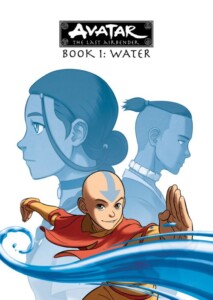A month and a half ago marked the 15th Anniversary of Nickelodeon’s Avatar: The Last Airbender television series created by Michael Dante DiMartino and Bryan Konietzko. The show won numerous awards, including a Genesis Award commending its raising awareness of animal issues. Seasons 1 and 2 of this three-season series are currently available for download on Hoopla.
 The plot of this martial arts fantasy/pseudo-anime centers on a young monk named Aang who is trapped in an iceberg after he learns that he is the Avatar, a spiritual leader charged with maintaining balance in the world—in this case preventing the dangerous Fire Nation from their plans of conquest. He is awakened by siblings Katara and Sokka to learn that a century has passed, the war is over, and the current Fire Lord is only months away from complete world domination.
The plot of this martial arts fantasy/pseudo-anime centers on a young monk named Aang who is trapped in an iceberg after he learns that he is the Avatar, a spiritual leader charged with maintaining balance in the world—in this case preventing the dangerous Fire Nation from their plans of conquest. He is awakened by siblings Katara and Sokka to learn that a century has passed, the war is over, and the current Fire Lord is only months away from complete world domination.
The drama is character-driven, primarily by the trio of Aang, Katara, and Sokka whose dynamics might remind viewers of Luke, Leia, and Han from Star Wars (Mark Hamill voices the Fire Lord, the series’ arch-villain) or of Harry, Hermione, and Ron from Harry Potter. There are also shades of Harry Potter in the Four Nations of Avatar, each with their own culture and philosophy, but something that really sets Avatar apart is its “villains.”
The double episode “Winter Solstice” in Season 1, which borrows plot elements from Hayao Miyazaki’s Princess Mononoke (Miyazaki’s Studio Ghibli films inspired the animation style for the whole show) showcases Aang’s primary antagonist, the exiled Prince Zuko. Zuko is a conflicted, teenage Ahab driven ![]() by the belief that capturing Aang and handing him over to the Fire Lord will restore his honor. But in this episode, Zuko is forced to abandon his pursuit of Aang to save his uncle, the venerable General Iroh, one of the show’s most compelling characters and essentially Yoda from Star Wars if he had been on the side of the Empire. Characters like Iroh and Zuko, Aang’s struggle to uphold his nonviolent ideals in a world at war, and the cultural diversity of the Four Nations provide plenty of platforms for exploring ethical and philosophical ideas all wrapped up in Saturday morning humor and a kid-friendly action/adventure plot.
by the belief that capturing Aang and handing him over to the Fire Lord will restore his honor. But in this episode, Zuko is forced to abandon his pursuit of Aang to save his uncle, the venerable General Iroh, one of the show’s most compelling characters and essentially Yoda from Star Wars if he had been on the side of the Empire. Characters like Iroh and Zuko, Aang’s struggle to uphold his nonviolent ideals in a world at war, and the cultural diversity of the Four Nations provide plenty of platforms for exploring ethical and philosophical ideas all wrapped up in Saturday morning humor and a kid-friendly action/adventure plot.
Hoopla also contains art and comic books tying into Avatar and its sequel series The Legend of Korra, including a series by Gene Luen Yang (American Born Chinese, Boxers and Saints) bridging the gap between the two:
Avatar: The Last Airbender
The Art of the Animated Series (2010)
The Lost Adventures (2011)
The Promise (2012) Part 1 – Part 2 – Part 3
The Search (2013) Part 1 – Part 2 – Part 3
The Rift (2014) Part 1 – Part 2 – Part 3
North and South (2016-2017) Part 1 – Part 2 – Part 3
The Legend of Korra
Book 1: Air – The Art of the Animated Series (2013)
Book 2: Spirits – The Art of the Animated Series (2014)
Book 3: Change – The Art of the Animated Series (2015)
Turf Wars, Part 1 (2017)
